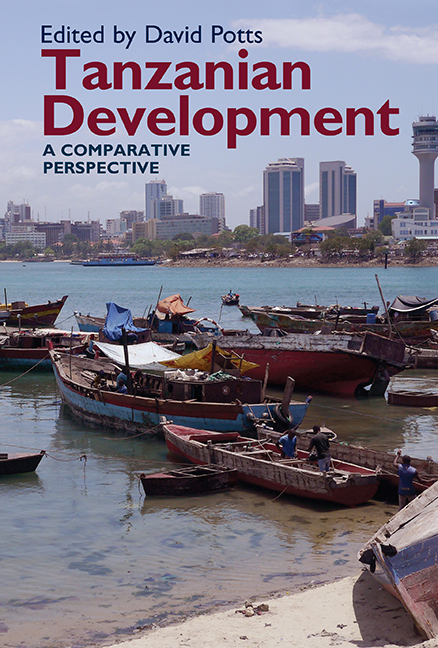Book contents
- Frontmatter
- Contents
- List of Illustrations
- Contributors
- Acknowledgements
- 1 Introduction – Tanzanian Development: A Comparative Perspective
- 2 The Political Economy of Tanzania 1967–2017: Reimagining the State
- 3 Reflections on the Tanzanian Trajectory: Decline and Recovery
- 4 Agricultural Development in Tanzania
- 5 Assets and Poverty Dynamics: The Methodological Challenges of Constructing Longitudinal Surveys in Tanzania
- 6 Contract Farming in Tanzania: Experiences from Tobacco and Sunflower
- 7 ‘We Just Sell Water – That is All We Do’: Two Cases of Small-scale Irrigation in Tanzania
- 8 The Industrial Development of Tanzania in Comparative African Perspective
- 9 Competitiveness in African Manufacturing: Some Evidence from Tanzania
- 10 ‘Good Life Never Comes Like Dreams’: Youth, Poverty and Employment in Arusha
- 11 International Aid to Tanzania – with some comparisons from Ghana and Uganda
- 12 Real Exchange Rate Changes and Export Performance in Tanzania and Ethiopia
- 13 Economic Leakage as a Constraint on Tourism's Effective Contribution to Local Economic Development in Tanzania
- 14 Extractive Industry Revenues and their Expenditure in Local Government Authorities: The Case of the Gold Service Levy in Geita District Council in Tanzania
- 15 Conclusion
- References
- Index
6 - Contract Farming in Tanzania: Experiences from Tobacco and Sunflower
Published online by Cambridge University Press: 24 October 2019
- Frontmatter
- Contents
- List of Illustrations
- Contributors
- Acknowledgements
- 1 Introduction – Tanzanian Development: A Comparative Perspective
- 2 The Political Economy of Tanzania 1967–2017: Reimagining the State
- 3 Reflections on the Tanzanian Trajectory: Decline and Recovery
- 4 Agricultural Development in Tanzania
- 5 Assets and Poverty Dynamics: The Methodological Challenges of Constructing Longitudinal Surveys in Tanzania
- 6 Contract Farming in Tanzania: Experiences from Tobacco and Sunflower
- 7 ‘We Just Sell Water – That is All We Do’: Two Cases of Small-scale Irrigation in Tanzania
- 8 The Industrial Development of Tanzania in Comparative African Perspective
- 9 Competitiveness in African Manufacturing: Some Evidence from Tanzania
- 10 ‘Good Life Never Comes Like Dreams’: Youth, Poverty and Employment in Arusha
- 11 International Aid to Tanzania – with some comparisons from Ghana and Uganda
- 12 Real Exchange Rate Changes and Export Performance in Tanzania and Ethiopia
- 13 Economic Leakage as a Constraint on Tourism's Effective Contribution to Local Economic Development in Tanzania
- 14 Extractive Industry Revenues and their Expenditure in Local Government Authorities: The Case of the Gold Service Levy in Geita District Council in Tanzania
- 15 Conclusion
- References
- Index
Summary
Contract farming, where farmers sign contracts that commit them to growing specific crops or products and selling them to specific purchasers, is an important part of agriculture in developed countries. They are found in some situations in developing countries, when ‘outgrowers’ contract to supply an estate or company, which runs a processing operation such as a tea or sugar factory, or when exporters are committed to supply high-value crops for export, such as cut flowers or spices. Their relative importance is likely to continue to increase.
Farmers also sign contracts when they accept inputs on credit. The contracts specify that they will sell their crops to a cooperative or trading organization that has arranged credit, which will deduct the costs of the inputs supplied from the money paid to the farmers for their crops.
This chapter investigates some of the issues that have arisen when contract farming has been attempted in Tanzania. It draws on data from two research studies, which sampled farmers who were growing flue-cured tobacco, where contracts have been institutionalized for more than fifty years, and sunflower where contracts were introduced but did not survive as a significant component of the marketing system. From these studies and desk research, the chapter draws conclusions about what is needed to sustain and further develop contract farming in Tanzania.
Background
Eaton and Shepherd start their widely quoted briefing note by pointing out that contracts are not new and cover many situations. Thus any system of share-cropping, in which a landlord is entitled to a share of the harvest, implies a contract. T. J. Byres shows that the Greeks had systems of share-cropping more than 2,500 years ago (Byres 1983; 3). Some of the most exploitative share-cropping was in the Southern states of the USA in the last half of the nineteenth century. More recently, in Africa, farmers, recruited in the 1950s to the Gezira irrigation scheme on the Nile in the Sudan, signed contracts that required them to grow cotton and sell it to the scheme. The World Bank-funded schemes to support farmers growing a number of crops in Tanzania in the 1970s and 1980s included credit supported by contracts. Contracts are also fundamental to agri-business, when processing companies contract with large farms, but also when large farms or marketing agents contract with smaller outgrowers (Watts 1994: 26–8; Eaton & Shepherd 2001: 1–2).
- Type
- Chapter
- Information
- Tanzanian DevelopmentA Comparative Perspective, pp. 116 - 139Publisher: Boydell & BrewerPrint publication year: 2019

